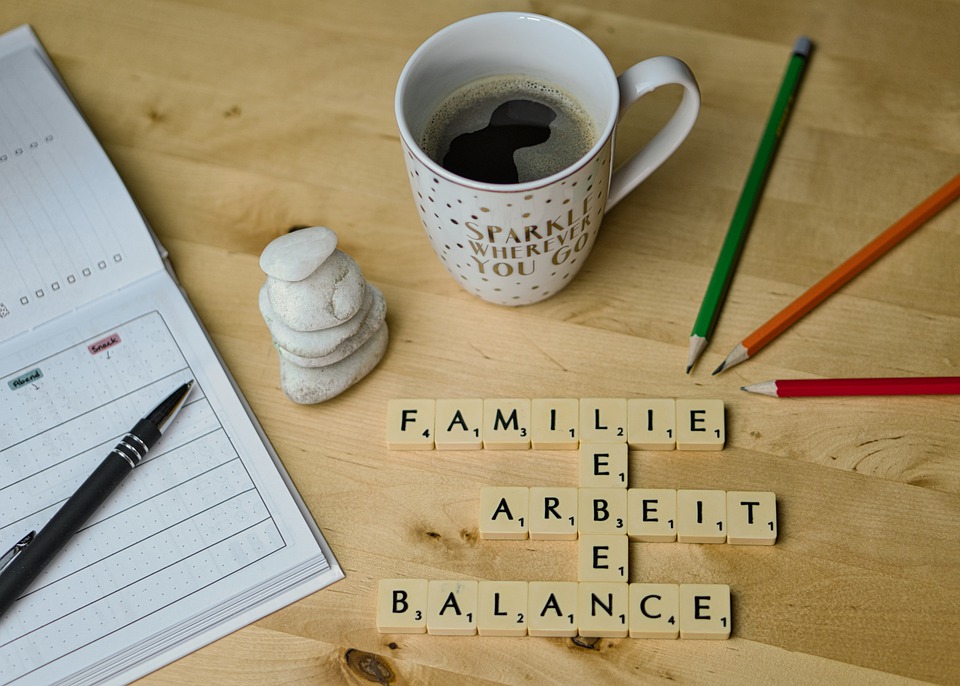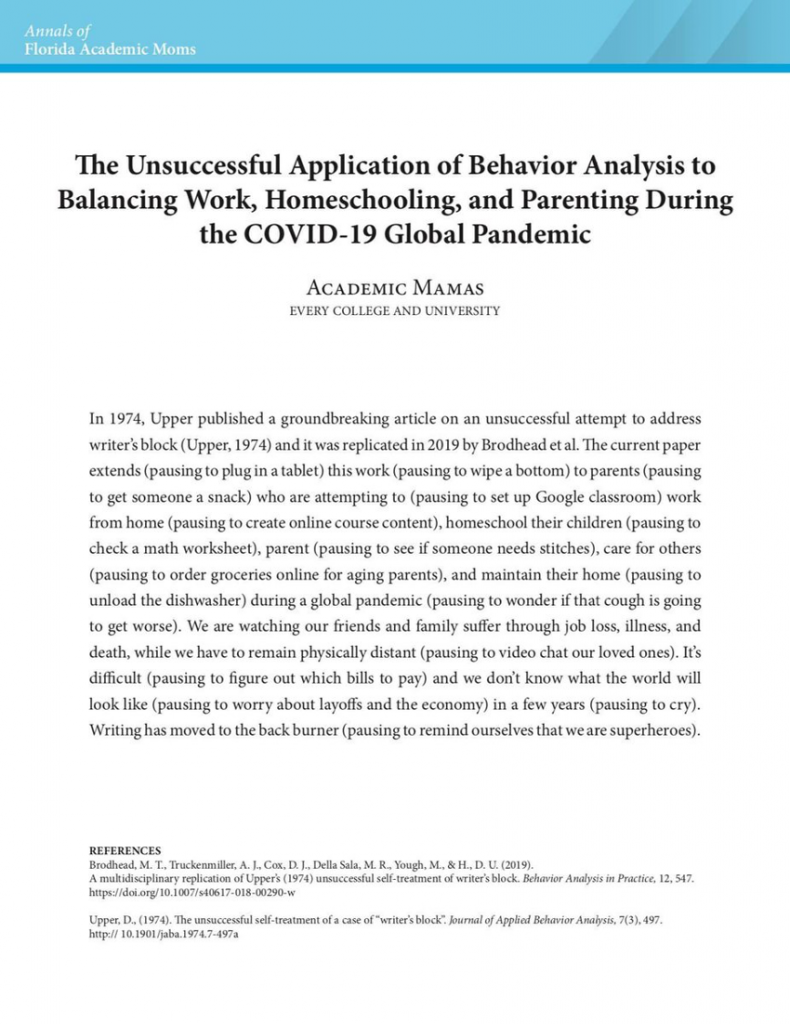
01 Sep Reflections on ‘Balancing Work, Homeschooling, and Parenting’ during COVID-19

Earlier this year, the image above ‘went viral’ on social media. Reflecting on the challenging routines of women during the COVID19 pandemic, the image depicts an academic article’s first page where the abstract is punctuated by the constant interruptions and anxieties of its authors’ lives. In fact, the image seeks to highlight the difficulties of carrying out academic tasks (writing, in particular) in a context where professional and family life are blurred, and parenting and other forms of care work tend to fall, unfairly, on women’s shoulders.
The image is fictitious, its authors are unknown, but its message has clearly been taken seriously. Women all over the world working in academia posted or tweeted this image on their social media channels. They have exposed some of the specific difficulties faced by women during the pandemic, in particular those who need to remain academically productive which, to a large extent, means to keep on writing and publishing.
Here at IGOT (the Institute of Geography and Spatial Planning), University of Lisbon, classes have been switched to online platforms. The institute’s building and all of the university’s facilities (libraries, reading rooms, canteens, offices etc.) are closed. Working from home suddenly became the only option, and it has affected both professors and early-career researchers, such as PhD students.
We asked three colleagues from IGOT to share some of their reflections about writing from home, parenting and keeping sane during these difficult times. They have given us their honest and critical accounts and raised important questions about the precarity of academic work, the politics parenting at home, and the mental distress of trying to keep on writing.
Here is the account by an early-career researcher who tells us about being active in relation to work (which does not always equate to being able to write academic papers):
When I saw the image, I immediately felt compelled to share it in my social network, which I did, tagging some of my colleagues who are mums in that post. This is telling, as I am not the most active person on social networks, and even less when it comes to ‘tagging’ people in posts. Of course, this ‘impulse’ relates to identification. I could say I was feeling the same things expressed in the parenthetical parts of the text: there was so much more in my mind and in the material space of my house, that either requested my immediate action (such as ‘wiping a bottom’), or a sustained emotional labour (such as dealing with the anxiety caused by a global pandemic), that, indeed, ‘writing moved to the back burner’.
But, as my research field dealt with people made vulnerable and disenfranchised, I was more active than ever in relation to ‘work’ as the pandemic has given visibility the structural inequality in the economic, social, labour, housing and health systems. Covid ‘invaded’ my research grounds because it was spreading rapidly among the subjects of my research: forced into quarantine without hygienic housing conditions. Therefore, I was super active in writing: emails to the responsible institutions, articles in the Portuguese media, contact with foreign journalists, writing for a foreign blog, team-writing for an emergency intervention project, fundraising through my social network and organizing the direct distribution of basic goods in order to fill, in the form of pragmatic solidarity, the gaps left by the responsible organizations. In fact, what had moved to the back burner was academic writing.
So, I ask myself: what did I identify with in that ‘fake’ paper? Was it really about the pandemic and quarantine with a 3-yearold in the house? Could I find the time to advocate for the people I do research with and not do academic work, because the latter is a kind of work that requires silence, time, solitude? Or is this about something else? I really think it is about something else and I repeat: the pandemic has (just) given visibility to structural relations of inequality. My partner works for a company, I am a scholarship holder i.e. one has a job, the other kind of doesn’t. The scholarship holder’s job has no hours, no fixed location: before, during and after the pandemic. The scholarship has a fixed term ending (the work contract, in this case, hasn’t) – and after that ending, there is the uncertainty (with or without pandemic). The economic certainty that our household has, comes from the work contract in the company. It is to material certainty that we give priority to, and therefore, the sacrificial choices in terms of juggling work and family life are made on this basis: before, during and after the pandemic. But I have a feminist partner, who shares household chores and parental responsibilities, and who is perfectly capable of understanding ‘academic work’ as he was once a scholarship holder. If our working roles were reversed, our priorities and ‘sacrifices’ and choices would rest on the same labour division we have now. Therefore, academic writing is always moved to the back burner not because I am an ‘academic mum’, but because of the structural conditions of academic work in late capitalism. But academic writing in my case is always moved to the back burner because I am an ‘academic mum’ i.e. working from within the structural conditions of academic work in late capitalism which intersect with the structural naturalized labour of being a mum.
Another account by an early-career researcher, who is also a mum and talks about the challenging of multitasking at home:
In ‘normal’ and modern times, being a woman, having a family and aiming for an academic career is quite a challenge. You need to be multitasking on all fronts, for example you need to be a lovely girlfriend/partner/wife and mother, a bit devoted to the ‘family project’ (otherwise people will ask you why you did that), well informed on the world news, with strong ideas, criticism and reflection and so on. In practice, you have a full-time job, that is keeping everything functional in your household and life in general, and then a part-time job to read, to reflect, to write, to go to conferences and organize your academic life.
In pandemic times there is no time for part-times! Not only writing has moved
to the back burner, as Academic Mamas say, but so has reading, breathing,
taking a bath, keeping sane, safe, well humoured, motivated, focused… You are
at home 24h/7 and you are asked to do the usual, plus take care of your
children. You might ask ‘Where is your partner? Don’t you split the tasks?’
Well, I do. But it is not enough, because academic work does not (always) have
the same rules, deadlines and visible results as other jobs or careers have,
and it is easily (again) moved to the back burner. In pandemic times, being a
woman, having a family and aiming for an academic career is THE challenge.
Below we can read the poignant words of one of the institute’s Professors:
At the begging it was chaos. Kids at home, myself at home, my parents with us. Going to the supermarket for loads of food… and some toilet paper, yes, I admit. Restructuring our lives in a haste. Classes through Zoom/Colibri for the children. What the hell is Zoom? A lens that focuses? Is Colibri something else than a tiny bird? We had to learn quickly how to work with virtual platforms we has never heard of, like Google Classroom and Virtual School (Escola Virtual).
Now (home)work is everywhere. The dinner table is covered with maths and English books, paper cuts for the Fine Arts classes, and printed exercises that need to be upload in the Google Classroom after completion. I have work meetings also remotely and they are not shorter than before, on the contrary. Some people have the gift of the gab, no matter the circumstances. I miss my office mates and colleagues deeply. I would love to hug them again, to touch them and give the so-Portuguese ‘little kisses’ on both cheeks. I really miss the human touch. Can you believe that still in February I thought that the 10-minute-chat over coffee took too much of my ‘precious’ time?
But the truth is that I’m lucky! I’ve got my parents to help me in times of crisis. To be honest, I’ve always had. I can count on them for almost everything. When I compare myself to other female colleagues who do not have backup support, I can see the difference. I can go out and leave the kids with them. I don’t have to cook lunch. My mother does it for us while my father takes the laundry to the ironing shop and divides up the garbage into three different trash bins.
My husband helps with the IT resources and the kids have easy access to online classes. They use his two computers and take advantage of the broadband he had installed all over the apartment. I can’t complain, really! Of course, I still need to supervise Ana’s homework and the amount of time she spends on the internet playing Roblox. Manuel is more autonomous. He hardly needs my help, but still have to be there for him.
Being on sabbatical leave is a privilege in times like this but writing has become more challenging. Home has become The Office and The School. Thus, focusing on reading, thinking and writing articles is difficult. Sometimes I feel like going away to an imaginary office where I can meet my peers and talk about our common research topics. But I feel I shouldn’t complain, really. How can I complain when my colleagues are drowned in classes, students’ emails and exams to mark? I’m a privileged researcher, at least for these two semesters. I feel the pressure to be productive in the written form but the kids’ classes will end next week and they will be staying at home. How am I going to find time and space for my research? How am I going to focus on writing? This is really getting on my nerves.
I also feel less free. Every time I go out, I have to tell the kids or my parents where I’m going. When I was in the office I left whenever I felt like and there was no need to tell anyone about my whereabouts. I decided to run in the neighbourhood because the gym was closed. Surprisingly, that makes me feel incredibly free. It gives me a very fulfilling sense of freedom that is new to me. It’s very pleasant and I often long for that moment at the end of the afternoon. It makes me feel stronger. But I still miss the physical touch I had from my colleagues; I truly do.



No Comments